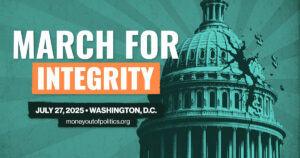Contributed by: Terri Glass
In 1787 Alexander Hamilton stood before the Constitutional Convention and argued that this newly won country should be a monarchy. He was progressive enough to want the rulers of America to be elected, but only once, after which they would continue to rule unless they were impeached for bad behavior. He thought that having a way to remove a corrupt ruler was sufficient. Most of the others at the convention didn’t like this idea, but it shows us that many of our founders did not have a problem with monarchy, they had a problem with corruption.
The American colonists would probably have been fine with King George III if he had been what they considered a good king. They just wanted a fair chance, but by the mid-1700s the East India Company (EIC) essentially owned the British government. Because of this, the EIC was guaranteed monopolies on just about everything, and had the full support of the king in all things because he needed (wanted?) their money. Most of us are familiar with the list of grievances in the Declaration of Independence, but many may not know that these things were done in support of the EIC.
The explicitly guaranteed monopoly the EIC had on tea is well known, but laws favoring the EIC all but guaranteed a monopoly on any desirable trade. Molasses is a good example. Laws regarding the molasses trade made it nearly impossible to enter the business. Someone would require resources similar to the EIC, which by that time was making its own money, fielding its own armies, and governing its own lands.
The purpose of a monopoly is to maximize profits, and that’s what the EIC did — prices kept going up and the colonists had neither the voice nor the resources to change the unfair laws protecting the EIC. With money dictating British law and petitions to the king for relief producing either no response or even sterner laws, the colonists all but decided that they had no king. A king was supposed to protect his people, and George was doing the opposite. A corrupt king was no king at all.
Fast forward to the 21st century, where history isn’t repeating itself but definitely rhymes.
If you’ve ever felt like government policy in the U.S. today doesn’t match what most people actually need, that is because it doesn’t. A 2014 Princeton University study showed that the very wealthy and business interests had a huge impact on policy while average citizens had almost no influence at all. Like the founders, most of us are shut out of the policy process.
Our government has become a pay-to-play institution. To know that this is true, we need look no further than the letters and emails and texts and ads that bombard us daily asking for money. Since when does an elected representative need a wad of cash to go cast a vote? They need tons of money just to get into office, and then immediately start asking for more money. That is not what our elected officials should be doing.
All branches of the current U.S. government are controlled by Republicans, but money dictating policy is the one thing that seems able to work across the aisle. The research cited above shows that policies follow the asks of moneyed interests no matter which party is in the majority. All elected representatives are targeted by big money’s lobbyists because it pays off so well. Where else but politics can investment yield an over 70,000% return? That’s not a typo. For every dollar the wealthy invest in political funding they receive about $750 in return. Can anyone get into this game? Of course not, the ante is millions of dollars.
Since the Citizens United decision in 2010, it is estimated that about a third of US political financing has been hidden funding — we have no idea where the money came from. In the 2024 election, 75% of this “dark money” was donations of $5 million or more, and almost half of the money supporting Trump came from just 10 donors. If money is speech, as the Supreme Court decided, then a handful of people have a megaphone while the rest of us are essentially gagged. It is not reasonable to think that public policy will reflect our needs when our government can hardly hear a thing we say.
The current President, Donald Trump, has shown nothing but authoritarian instincts, and this is the natural progression of corruption. When people attain positions of power through money and marketing, they are put into office neither by the people nor for the people. Trump, or someone like him, was inevitable. This power-grabbing, transactional president is an immediate threat that cannot be ignored if we want to save our democratic republic, and he absolutely must be removed from office, but is our wanna-be king the whole problem?
Lately, a lot of competition-killing policy has been pushed with the idea that businesses will be brought back to the U.S. It takes time, loads of money, and connections to do that. It seems more likely that, as with colonial molasses, those who already have loads of money and connections will simply get exemptions and government contracts that preclude competition altogether.
If that seems far-fetched, consider that the DOD just paid $200 million for AI that calls itself MechaHitler, checks to see what Elon Musk’s opinion is before answering questions, and cannot recognize Justin Bieber. Meanwhile, people in this land of plenty often work a job as well as a side hustle to make ends meet, go bankrupt because of medical bills, and watch prices go up and up while wages don’t.
The deeper problem of money controlling policy is why removing Trump is like treating an allergic reaction but not removing the allergen. By all means, let’s grab our epipen, but if we keep eating the food that gave rise to the attack then another attack is on the way. Eventually an attack might kill democracy altogether. It might be this one if we don’t act quickly.
A republic requires the voices of the people to be heard, but who is listening to us, we the people, when our government is headed to the next fundraiser? A democratic republic is very allergic to big money.


